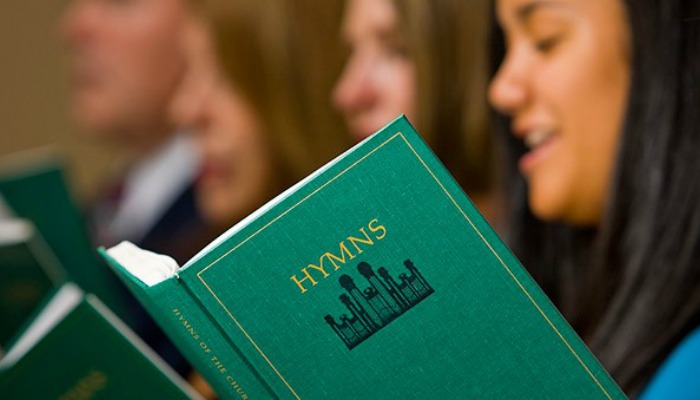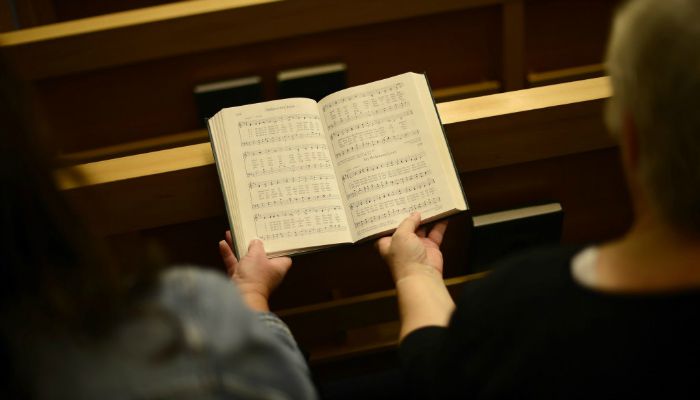
Get ready to breakdance: the new hymnal is coming on… Well, we don’t actually know when.
…and it probably won’t include any crunk songs, so I guess you can just forgot what I said about breakdancing.
But while we don’t know the exact date of the new hymnbook’s arrival, there are lots of things we do know, too — and the first thing is that submissions are due JULY 1!
Quick Facts

- This hymnbook is going to be the same across the world (although obviously languages will vary), so no national anthems will be included.
- You don’t have to submit music — you can also provide feedback on songs you’d like in the new hymnbook, songs you’d like taken out, and general commentary on the current hymnal.
- The new hymnal is being compiled/revised by committees working “under the direction of General Authorities and General Auxiliary Leaders. The committees are composed of Church employees and called members with expertise in a variety of areas, including music, education, literature, world cultures, and Church doctrine.”
- In addition to the new hymnal, a new children’s songbook is being created.
- People can submit lyrics, music, or music and lyrics (not to be confused with the Hugh Grant/Drew Barrymore movie). Standalone lyrics and music will be tested with “multiple text settings and tunes.”
- Anyone can submit music, although those under 18 will need parental or guardian consent.
What’s the Submission Process Like?
 In the process of writing this article, I spoke with several composers who submitted hymns for the new hymnal. Betsy Lee Bailey, an award-winning composer and former member of The Tabernacle Choir at Temple Square, submitted several songs and said of the submission process:
In the process of writing this article, I spoke with several composers who submitted hymns for the new hymnal. Betsy Lee Bailey, an award-winning composer and former member of The Tabernacle Choir at Temple Square, submitted several songs and said of the submission process:
“The submission process has a few specific steps. You must format your music a certain way. It must be written legibly in a notation program and saved PDF. You must submit two versions — one with your name and one without your name attached. When you are finally ready to go to the website to submit, you also need to tell a little about your music — what inspired you, what it could be used for, what are the intended voices or instrumentation — and also a little about yourself. They want to know about your family, mission, callings, where you live, etc. It was definitely more complicated than just ‘click and submit.'”
As for the actual songwriting experience, composer Mark Richins said, “I will honestly say that composing specifically for the new hymnbook has been a truly exhilarating experience. When I’ve composed before it’s always hit and miss in terms of how well it falls together. Some music pieces I’ve done (aside from hymns) have taken years to finish. Others have taken only a few weeks to a month. The hymns I wrote specifically for the submission have taken as little as three days. I literally felt like the melodies and harmonies were being placed in my mind, and I was honored to be the pen bearer to write them on paper. Whether or not my pieces are selected to go in the new hymnal, I will forever appreciate the experience I had composing for it.”
Rob Watson, who composed a hymn to accompany a poem an ancestor wrote, had a similar experience to Brother Richins:
“The experience was pretty astonishing for me . . . I had always struggled with composing. My piano teachers all gave up on teaching me. So when [composing for this piece] flowed like it did . . . I felt like I had the tiniest fractional understanding of what it was like for my favorite composer, Handel, to write his ‘Messiah.’ It’s admittedly a subjective experience that might seem to some outside of it like a delusion of grandeur, but it felt really authentic and good to me.”
The Likelihood of Getting a Song in the New Hymnal

Sister Bailey compared the buzz around the new hymnal to the excitement that once, before its publication, centered around the 1985 hymnbook.
“I was in college during the buzz for the new 1985 hymnal,” Sister Bailey said. “Many of my composer friends submitted hymns to that project. None of them were accepted at that time. I know many people who are so excited about the idea of getting one of their songs into the Children’s Songbook or hymnal for this go around. They are so euphoric about their chances. My attitude is more realistic, I think. . . Of the thousands of submissions, just a handful will even be considered. At best, I think most of the submissions might be lucky to have a chance of being included in the online LDS Music Library.”
Yet while the likelihood of being having one’s hymn chosen may be relatively slim, the songwriting journey was still valuable.
“Will I be disappointed if they’re not selected? I suppose that would be unavoidable,” Brother Richins said. “But yet it’s really not a competition. In the end, it’s all the Lord’s decision on what hymns He wants. I look forward to singing the latest musical revelations when the finished product is published.”
Brother Watson echoed the sentiment.
“Whether it gets selected or not, it was a good experience. And I can play it as postlude after sacrament and foist it on our ward choir,” he said jokingly.
While the new hymnal doesn’t have a specified publication date, (ChurchofJesusChrist.org just says, “Development of the prototypes for both books is expected to take several years as the committees coordinate together, considering both new and existing hymns and songs for inclusion. Translation of the books will begin after that work is complete.”) we are looking forward to the opportunity to sing songs both old and new.
In the Doctrine and Covenants, we’re commanded to “praise the Lord with singing” — and we can’t wait to do that one day soon with the new hymnbook.





